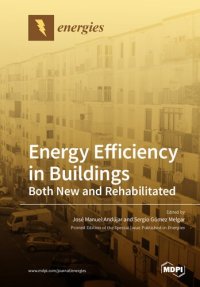
Ebook: Energy Efficiency in Buildings: Both New and Rehabilitated
Buildings are one of the main causes of the emission of greenhouse gases in the world. Europe alone is responsible for more than 30% of emissions, or about 900 million tons of CO2 per year. Heating and air conditioning are the main cause of greenhouse gas emissions in buildings. Most buildings currently in use were built with poor energy efficiency criteria or, depending on the country and the date of construction, none at all. Therefore, regardless of whether construction regulations are becoming stricter, the real challenge nowadays is the energy rehabilitation of existing buildings. It is currently a priority to reduce (or, ideally, eliminate) the waste of energy in buildings and, at the same time, supply the necessary energy through renewable sources. The first can be achieved by improving the architectural design, construction methods, and materials used, as well as the efficiency of the facilities and systems; the second can be achieved through the integration of renewable energy (wind, solar, geothermal, etc.) in buildings. In any case, regardless of whether the energy used is renewable or not, the efficiency must always be taken into account. The most profitable and clean energy is that which is not consumed.